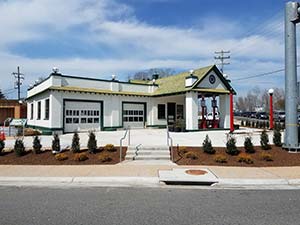The following is a guest blog written by Fairfield Foundation intern and volunteer Genevieve Brei, detailing her adventures exploring some of Gloucester’s written records.
As soon as I touched the Gloucester County Courthouse Minute Books, I knew that I was hooked. Fellow bibliophiles will confirm that there is nothing quite like handling old manuscripts, feeling the soft smoothness of paper with every turn of the page. This is particularly true of the Minute Books, where the paper has a different texture and weight than most modern paper. However, tactile joy is merely icing on the proverbial cake: these 19th-century documents contain pertinent historical information about Gloucester that is virtually impossible to get from other records.
Back in 2012, I was a summer intern with the Fairfield Foundation after a very successful introduction through a W&M pre-collegiate summer history class (NIAHD). Most days were spent doing archaeology in the field, where I embraced history that I could physically uncover and touch.
During that time, I was also given the opportunity to research property records in the courthouse. I enjoyed it so much that just before matriculating to The College of William and Mary, in 2013, I returned as a summer intern to Fairfield to focus on researching courthouse documents. When I was offered the chance to summarize the Minute Books, I leapt at it. It didn’t perturb me too much that I had no idea what I was doing.
Gloucester County Minute Books essentially recount everything that happened in court on a day-to-day basis. From lawsuits to legal contracts to allocations of county funds, everything that went before the justices was recorded. The 1820 Minute Book (my project) is particularly useful because a significant amount of the book is re-recordings of older transactions that were lost in the Clerk’s Office fire earlier that year. A lovely multitude of names and family relationships are referenced, making this project useful not only to historians and archaeologists, but also to genealogists.
Initially, summarizing was a process of trial-and-error. Nineteenth-century script was mostly an enigma to me and the chief complexity was that so many of the letters were formed differently in the 19th century than today. I created a list of letters that I commonly mistook for others: “s” and “p” and “j” were a few of my so-called “problem children.” Of course, the spelling of names was not always consistent and the handwriting itself varied in clarity depending on the pen, ink, and clerk. Luckily, legalese has not changed too much within the last hundred-odd years and the abbreviations used by the clerks of court gradually made sense to me. Each time I figured out what a page said, I felt victorious. As with everything, reading the handwriting became easier and easier and I made fewer and fewer mistakes as I went along.
Once I could determine what was written, I also had to decide how to summarize the documents. As far as I could tell, the majority of the events written into a few general categories and this enabled me to come up with a rough outline that refined over time. Formatting was tricky because everything needed to stay in the order in which it was written, but at the same time, I wanted to group by category. Eventually, I had a rough draft that I revised and revised until I was satisfied with the finished product.
The process of summarizing the Minute Books takes patience and tenacity, and I was fortunate enough to find encouragement not only from the wonderful people at the Fairfield Foundation, but also other Gloucester area historians/genealogists who took the time to go over my work and show me how to make it stronger and more coherent (with particular thanks to Bill Lawrence and Roane Hunt). In terms of future projects, I look forward to working on the next Minute Book (1821) as a joint project with the Fairfield Foundation and the Gloucester Historical Society. There is so much Gloucester history and genealogy to be discovered, and I truly hope that my work with the Minute Books can facilitate a better understanding of the past.
Soon you will be able to own a copy of Genevieve Brei’s 1820 Minute Book Summary. Through the support of the Gloucester Historical Society and the Gloucester Genealogical Society, this work will be accessible to the public (available for purchase for $20 at the Gloucester Visitor’s Center and the Museum of History) and benefit all of us eager to learn about our communities and, in particular, search for our families in the past.


History is always a Surprise!
Norm C.
Why not put it on line?